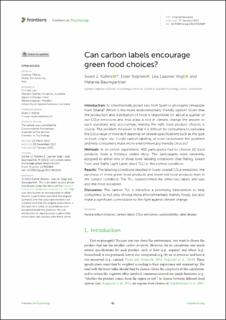Bitte benutzen Sie diese Kennung, um auf die Ressource zu verweisen:
https://doi.org/10.21256/zhaw-26742| Publikationstyp: | Beitrag in wissenschaftlicher Zeitschrift |
| Art der Begutachtung: | Peer review (Publikation) |
| Titel: | Can carbon labels encourage green food choices? |
| Autor/-in: | Kühne, Swen J. Reijnen, Ester Laasner Vogt, Lea Baumgartner, Melanie |
| et. al: | No |
| DOI: | 10.3389/fpsyg.2022.902869 10.21256/zhaw-26742 |
| Erschienen in: | Frontiers in Psychology |
| Band(Heft): | 13 |
| Heft: | 902869 |
| Erscheinungsdatum: | 2023 |
| Verlag / Hrsg. Institution: | Frontiers Research Foundation |
| ISSN: | 1664-1078 |
| Sprache: | Englisch |
| Schlagwörter: | Food product choice; Carbon label; CO2e emission; Sustainability; Label design |
| Fachgebiet (DDC): | 158: Angewandte Psychologie 338.927: Umweltökonomie und nachhaltige Entwicklung |
| Zusammenfassung: | Introduction: A conventionally grown kiwi from Spain or an organic pineapple from Ghana? Which is the more environmentally friendly option? Given that the production and distribution of food is responsible for about a quarter of our CO2e emissions and thus plays a role in climate change the answer to such questions and, accordingly, making the right food product choices is crucial. The problem, however, is that it is difficult for consumers to calculate the CO2e value of food as it depends on several specifications such as the type of food, origin, etc. Could carbon labeling of food circumvent this problem and help consumers make more environmentally friendly choices? Methods: In an online experiment, 402 participants had to choose 20 food products from a fictitious online shop. The participants were randomly assigned to either one of three food labeling conditions (Star Rating, Green Foot, and Traffic Light Label, short TLL) or the control condition. Results: The labeling conditions resulted in lower overall CO2e emissions, the purchase of more green food products and fewer red food products than in the control condition. The TLL outperformed the other two labels and was also the most accepted. Discussion: The carbon TLL is therefore a promising intervention to help consumers to not only choose more environmentally friendly foods, but also make a significant contribution to the fight against climate change. |
| URI: | https://digitalcollection.zhaw.ch/handle/11475/26742 |
| Volltext Version: | Publizierte Version |
| Lizenz (gemäss Verlagsvertrag): | CC BY 4.0: Namensnennung 4.0 International |
| Departement: | Angewandte Psychologie |
| Organisationseinheit: | Psychologisches Institut (PI) |
| Enthalten in den Sammlungen: | Publikationen Angewandte Psychologie |
Dateien zu dieser Ressource:
| Datei | Beschreibung | Größe | Format | |
|---|---|---|---|---|
| 2023_Kuehne-etal_Can-carbon-labels-encourage-green-food-choices.pdf | 1.43 MB | Adobe PDF |  Öffnen/Anzeigen |
Zur Langanzeige
Kühne, S. J., Reijnen, E., Laasner Vogt, L., & Baumgartner, M. (2023). Can carbon labels encourage green food choices? Frontiers in Psychology, 13(902869). https://doi.org/10.3389/fpsyg.2022.902869
Kühne, S.J. et al. (2023) ‘Can carbon labels encourage green food choices?’, Frontiers in Psychology, 13(902869). Available at: https://doi.org/10.3389/fpsyg.2022.902869.
S. J. Kühne, E. Reijnen, L. Laasner Vogt, and M. Baumgartner, “Can carbon labels encourage green food choices?,” Frontiers in Psychology, vol. 13, no. 902869, 2023, doi: 10.3389/fpsyg.2022.902869.
KÜHNE, Swen J., Ester REIJNEN, Lea LAASNER VOGT und Melanie BAUMGARTNER, 2023. Can carbon labels encourage green food choices? Frontiers in Psychology. 2023. Bd. 13, Nr. 902869. DOI 10.3389/fpsyg.2022.902869
Kühne, Swen J., Ester Reijnen, Lea Laasner Vogt, and Melanie Baumgartner. 2023. “Can Carbon Labels Encourage Green Food Choices?” Frontiers in Psychology 13 (902869). https://doi.org/10.3389/fpsyg.2022.902869.
Kühne, Swen J., et al. “Can Carbon Labels Encourage Green Food Choices?” Frontiers in Psychology, vol. 13, no. 902869, 2023, https://doi.org/10.3389/fpsyg.2022.902869.
Alle Ressourcen in diesem Repository sind urheberrechtlich geschützt, soweit nicht anderweitig angezeigt.